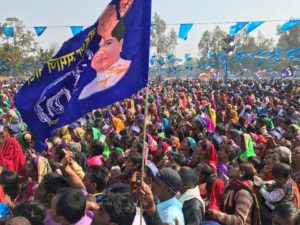
The Bilhaur constituency on the outskirts of Kanpur is reserved — but for whom was the question Mayawati helicoptered down to answer last week.
Thousands of blue-hatted supporters of the Bahujan Samaj Party (BSP) sat in orderly rows, and blue and white flags fluttered in the breeze, as Mayawati stood on a podium and urged voters to support Kamlesh Diwakar, the BSP’s candidate for Bilhaur — one of 85 seats earmarked for candidates from the historically oppressed Scheduled Caste, or Dalit, community in Uttar Pradesh.
Yet much of Mayawati’s speech was directed at UP’s Muslim minority, whose fear of a Bharatiya Janata Party (BJP) government inspired by Hindutva, she hoped, would push them to vote BSP.
Infighting in the Samajwadi Party had divided their core Yadav vote, said Mayawati. “So the minority community must give their one-sided vote… only to the Bahujan Samaj Party, which has a united Dalit base vote and is best placed to defeat the BJP.” She added, “Votes for the Samajwadi Party will not only be completely useless but will end up favouring the BJP.”
Dalits comprise the BSP’s most ardent supporters, suggesting the party should do well in reserved seats such as Bilhaur, but BSP supporters say that such seats are often the hardest to win.
UP’s reserved seats show no decisive swing in favour of the BSP, as per Election Commission data from 1996 to 2012. On the contrary, in 2012, the BSP had a higher win rate in the general constituencies. It won 20%, or 65 of 318, of the general seats, but 17%, 15 of 85, of the reserved seats.
“The irony is that in reserved seats, the Dalit vote is divided between candidates, so general castes become the king-makers,” said Desh Raj Katihar, a BSP supporter from Bilhaur. “No one can win UP with the support of just one community.”
BSP founder Kanshi Ram perceived a flaw in this system intended to increase Dalit political representation, contrasting it with the provisions under the Communal Award of 1932 which granted separate electorates for all sections of society – including Dalits.
In 2007, Mayawati fought off her supposed chamcha opposition by stitching together an unlikely coalition of Dalits and Brahmins to outfox the SP’s OBC vote base. But in 2012, a 3% swing in the vote share brought the SP back to power. Now the BJP has sought to make inroads into sections of the Dalit base, which pushed her to speak of the atrocities committed on Dalits by the BJP’s upper caste base.
“The BJP is oppressing people in the name of love jihad, cow-protection and nationalism,” she said. “When I saw the Una flogging, I felt as if the blows were falling on my back.”
At her rally, Mayawati spoke with the steady assurance of a school mistress, often repeating the same sentence several times to ensure her message got through.
Kali Devi, a young woman pressed up against the barricades erected in front of the stage, said, “The BJP broke our backs, the SPs criminals harassed our women. Behenji (Mayawati) will bring order; she will save us from these goons.”
In 2007, Mayawati fought off her supposed chamcha opposition by stitching together an unlikely coalition of Dalits and Brahmins to outfox the SP’s OBC vote base. But in 2012, a 3% swing in the vote share brought the SP back to power. Now the BJP has sought to make inroads into sections of the Dalit base, which pushed her to speak of the atrocities committed on Dalits by the BJP’s upper caste base.
“The BJP is oppressing people in the name of love jihad, cow-protection and nationalism,” she said. “When I saw the Una flogging, I felt as if the blows were falling on my back.”
At her rally, Mayawati spoke with the steady assurance of a school mistress, often repeating the same sentence several times to ensure her message got through.
Kali Devi, a young woman pressed up against the barricades erected in front of the stage, said, “The BJP broke our backs, the SPs criminals harassed our women. Behenji (Mayawati) will bring order; she will save us from these goons.”(HT)







































